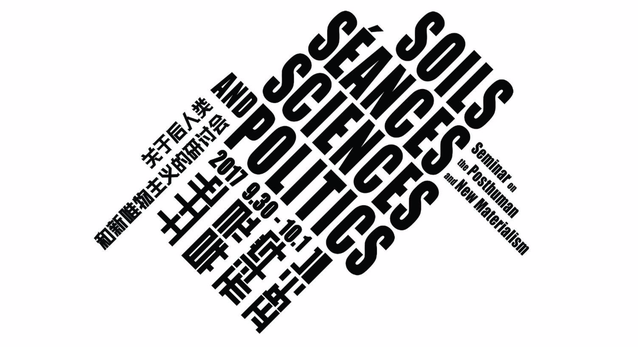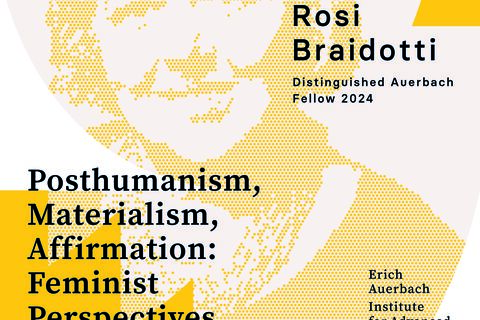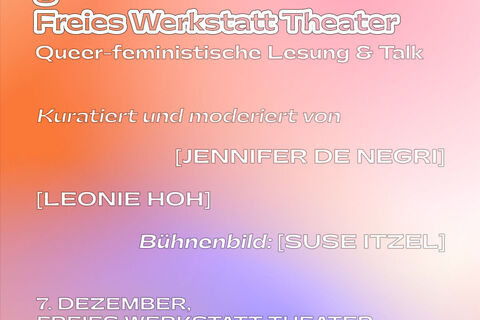- Exhibition
- Awards
- Library
- Speech
- edition KHM
- Festival / Award ceremony
- FG exMedia
- FG Film und TV
- FG Kunst
- FG Kunst- und Medienwissenschaften
- Movie screening
- Glasmoog Books
- Glasmoog - Raum für Kunst und Diskurs
- KHM Journal
- Concert
- Cooperation
- LAB Jahrbuch
- LECTURE Reihe
- Teachers elsewhere
- literature
- off topic
- News articles
- Publications
- Job offers
- Study
- TV broadcast
- Event
- all
Mi You "A few thoughts on new materialism(s) and Confucianism(s)" at Institute for Provocation / Goethe Institut Beijing

Goethe-Institut China, Originality Square, 798 Art District, Jiuxianqiao Road 2, Chaoyang District
Peking
Soils, Séances, Sciences and Politics (SSSP)-
Seminar on the Posthuman and New Materialism
SSSP was conceived by Kristiina Koskentola and Institute for Provocation (Hu Wei and Song Yi), and is generously being hosted by the Goethe-Institut, Beijing.
Keywords: Posthumanism, futurology, Confucian take on technology, New Materialism, Cartesian dualism as fraud, environmentalism, computational algorithmic processes in light of Neo-Confucianism, human as one species among others, ecology, sustainability, biology, bodies and technological beings, non-human agency, Confucian views on the Posthuman, modernist science fiction, hybrids, pre-history as future, material-discursive labour and speech, non-carnal births (and deaths), processuality, animism, and more.
This discursive and performative 2-day seminar will open up diverse topics relevant to Posthumanism and New Materialism such as, technology, ecology, sustainability, agency, and materiality. An international group of cultural and scientific practitioners—artists, curators, researchers, and theorists—will gather to collectively reflect on these urgent issues with and through diverse art practices.
The honourable speakers and performers are Rick Dolphijn, Fu Xiaodong, Jussi Koitela, Shian Law, Liu Chengrui, Liu Yuedi, Jussi Parikka (mediated presentation), Marina Vishmidt, Jo Wei, You Mi, Zheng Bo.
Video screening of works by Rumiko Hagiwara, Hu Wei, Kristiina Koskentola, Tuomas A. Laitinen, Liu Yujia, Sascha Pohle, Miguel Ángel Rego Robles, Song Yi, Tian Xiaolei, Yang Jian.
Abstract:
My talk attempts to illustrate a few conceptual approaches to Confucianism relative to today’s technologized society. On a “micro” level, I question whether Confucianism and speculative philosophy are reconcilable on the question of technology/automation, using the example of Whitehead. While both systems favour processuality over fixed entities in their analyses of beings and phenomena of the world, can computational algorithmic processes, or “computational thinking,” be recast in light of the Neo-Confucian notions of gan, in dialogue with Whiteheadian notions of prehension and speculative reason? On a historical level, I will examine the question of how desire is tamed within the Chinese cosmological order (as expressed in the Chinese “philosophy of technology”), in the larger context of untied desire in late capitalism. I contend that today’s omnipresent technologization presents a condition which is difficult to surmount by returning to a previous world order. Finally, I will look into the creativity of matter itself, which overspills the frame of scientism, to propose a Confucian approach – in tandem with new materialism – that widens our understanding of science and technology.
- Exhibition
- Awards
- Library
- Speech
- edition KHM
- Festival / Award ceremony
- FG exMedia
- FG Film und TV
- FG Kunst
- FG Kunst- und Medienwissenschaften
- Movie screening
- Glasmoog Books
- Glasmoog - Raum für Kunst und Diskurs
- KHM Journal
- Concert
- Cooperation
- LAB Jahrbuch
- LECTURE Reihe
- Teachers elsewhere
- literature
- off topic
- News articles
- Publications
- Job offers
- Study
- TV broadcast
- Event
- all







